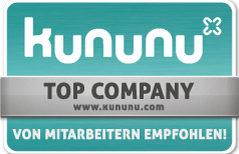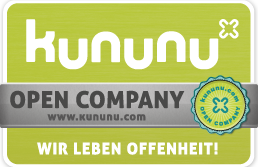7 questions for... Thomas Felgenhauer
1. Mr Felgenhauer, at the beginning of 2018 you symbolically pressed the start button for the go-live of your new SAP® system. What has happened since then in terms of digitisation? How digital is your company today?
Thomas Felgenhauer: HOWOGE has experienced strong growth since 2018. And not only in terms of housing stock, but also technologically. The basis has indeed been our SAP® system as the central hub since 2018. We want to take full advantage of the possibilities offered by SAP®. Only when we push against our limits do we consider additional solutions, but always on the condition that communication is guaranteed via interface. So we stay true to our core component.
We’ve also invested heavily in our IT infrastructure. The best example: our new IT data centre came online this summer. As the data volumes continue to rise, we’re also creating the necessary technological foundation for the future. And we’ve also been preparing ourselves organisationally. Since the beginning of 2020, our new “processes and digitisation” area has focused on making new technological possibilities available to the entire company. We consciously named this area “processes and digitisation” because we do not just digitise for the sake of digitisation itself. Rather, we first establish meaningful and efficient processes and then digitise them. In other words, if a bad process is digitally mapped, it’s still a bad process.
Overall, a lot has happened with us since 2018 in terms of hardware, organisation, personnel and software.
2. Digitisation also plays into your sustainability strategy. Processes get leaner and more efficient, and communication with customers becomes more digital. How far do your digitisation measures go?
Felgenhauer: HOWOGE is going to become more digital. Our corporate strategy states that we’ll be 100% digital by 2035. That’s a statement, and it’s going to happen! Nevertheless, we’re not replacing the human factor. We want to deploy our current capacities more efficiently – including in terms of personnel. This results in productivity gains along all the processes in our company. Take the example of incoming invoices: HOWOGE receives about 130,000 invoices a year, so about 360 invoices per day, which were previously opened in the mail office and stamped before wandering through our offices in folders. Digital processes help us increase productivity here – by digitally tracking where the invoice is or by signalling when an invoice is stuck somewhere with a traffic light system. At the same time, all information from the purchasing department, for example, can be linked together. This then no longer has to be done manually in retrospect. All these tasks are performed systematically today at the touch of a button.
3. What other changes will it take for you to become 100 percent digital?
Felgenhauer: We just moved to a new corporate headquarters. And what do you do when you move? You have to pick everything up again. We had no less than 30,000 file folders at the beginning of this year. However, we didn’t just pack up and move. Instead, we prepared ahead of time and reduced the number to 5,000 folders. The rest has been digitised in our document management system. It significantly boosts our productivity if we can search our system by keywords and no longer depend on the filing cabinet in the office. All the mail we receive today no longer arrives at our office physically, but is available digitally on our screens. Both the document management system and SAP® have taken us an extraordinary step forward as the central nucleus for our strategy.
Another point with our office move is that we’re shifting away from the stationary workplace. Our employees can simply sit down at any workplace with their laptop or tablet PC at the corporate headquarters. There’s no longer a landline – that was yesterday. Today we use smartphones and headsets. This makes us very agile: I’m at work with my team today, and tomorrow I’m working on a project. This is the direction we’re taking – flexible, responsive, agile – to deliver our services efficiently and at the lowest possible cost.
4. And what do you see as the greatest added value?
Felgenhauer: It saves resources. That doesn’t mean that we want to reduce the resources available to us. On the contrary, HOWOGE is committed to growth. That’s why we want to generate more value with the available resources. We can achieve more with the existing systems, financial resources and personnel – this is our leap in productivity and efficiency. We produce more to the benefit of our customers and also to support our employees in working through tasks quickly and efficiently. The achievements of the day are greater for everyone, and working is even more fun. If the pandemic has shown us anything, it’s that we have to adapt flexibly to new situations. Every employee at HOWOGE was equipped with either a smartphone or a tablet within a very short time. This immediately enabled us to work remotely and flexibly wherever we are, and topics such as work and family life can be reconciled much better.
Or let’s look at property management. In the past, apartment handovers were carried out with 20-page protocols. Today, we check and sign forms on tablets at the touch of a finger. The handover is then complete and the process is immediately stored in the system, documented and automatically sent to the customer by mail or e-mail. This is the kind of added value that we’d like to see.
Bright Minds, Clear Insights
5. In the context of limited construction capacity, Berlin has a special position for growth in German cities. HOWOGE has completed almost 5,000 apartments since the start of the new construction campaign. Your company also invests in maintenance and repair. How do IT tools support your building measures?
Felgenhauer: We’re all dealing with limited financial resources. And as you mentioned, we’ve achieved a lot and constructed almost 5,000 apartments. But we still have more than 15,000 units in the pipeline over the next 10 years. We at HOWOGE can be proud to have renovated our entire housing stock from the mid-90s to the mid-2000s. But that doesn’t mean we’re done by a long shot. It’s crucial that we deploy our financial resources properly. And we need to do so precisely where the greatest added value lies. On the one hand, we need more housing. On the other, we need to manage our properties sustainably to achieve a climate-neutral housing stock. We have tools today that help us stay well informed about how building sites are progressing so we can steer the financial resources most effectively.
Let’s look into the future! The world is becoming more and more connected. Lifts may soon include a component that lets us know when they’re defective. After all, we’d rather not get the alarm once someone is already stuck in the lift, but preferably before. And that’s where the journey is leading. That’s what we’re preparing for. And in order to process this information, the SAP® system must be prepared with the corresponding locations. And the processes must also be designed in such a way that the craftsman is automatically dispatched when a defect is indicated, ideally with information on what component is affected. These are examples of how we dream of being 100 percent digital in the future.
6. What importance do you attach to your IT system and digitisation in your growth strategy?
Felgenhauer: To sum it up in one sentence: IT and digitisation are the guarantee ensuring that we can achieve this growth. It’s all about increasing productivity. But another aspect is that our society is growing older and the fight for the best talent has increased significantly. We’ll also be seeing many of our employees retire over the next three to five years. To be prepared for this development, we need intelligent IT solutions that help us along the way. The central provision of information and processes greatly simplifies the onboarding of new employees. And that, in turn, makes us attractive as an employer.
7. Finally, HOWOGE saves more than 100,000 sheets of paper annually thanks to digitally supported residential property inspections. Mr Felgenhauer, tell us the truth. Do you personally still use the classic notebook and pen or is your desk completely free of post-its?
Felgenhauer [laughs]: Well, I wouldn’t necessarily call my desk paperless. But I don’t have a physical notebook anymore. My personal paper consumption is limited to less than one DIN A4 page per day. There are also a few post-its, everything else is digital. But I still indulge in the luxury of these couple of sheets.
Thank you for the interview.
redaktion@openpromos.de
- As of March 2021: https://www.howoge.de/unternehmen/ueber-die-howoge.html
7 questions for...
is dedicated to digital innovations in the real estate industry. How well placed are companies? Which measures are they focusing on? Experts and industry insiders answer questions in brief interviews.
Part 5:
Thomas Felgenhauer, Managing Director of HOWOGE

